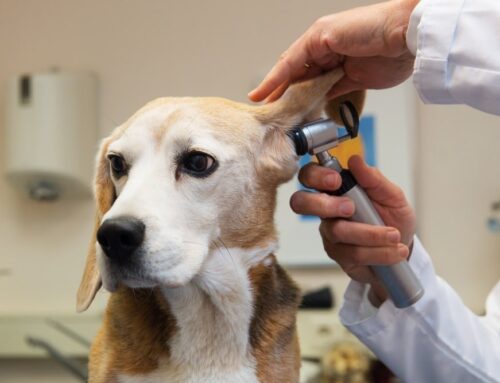Worried About Allergies? How to Keep Pets Comfortable This Season
A dog that spends the night licking their paws, a cat that scratches until their fur thins, or a pup that suddenly sneezes non-stop when they step outside- these changes are more than quirks. They are often signs of seasonal allergies, one of the most common yet overlooked conditions in pets. Allergies can cause nonstop itching, recurring ear infections, and restless nights for the whole household.
Because pets can’t explain what’s bothering them, their skin, ears, and behavior tell the story instead. The good news is that once you understand how allergies work, there are proven ways to bring your pet relief. In this guide, we’ll cover what triggers seasonal allergies, the signs to watch for, and how Emerald Animal Hospital helps families manage symptoms so pets can stay healthy, comfortable, and happy year-round.
What Are Seasonal Allergies in Pets?
Seasonal allergies, also known as atopic dermatitis, happen when a pet’s immune system reacts too strongly to harmless things in the environment, such as pollen, mold spores, or dust mites. This reaction triggers inflammation that shows up in the skin, ears, and sometimes the digestive system.
Some breeds are more likely to develop allergies than others. Retrievers, Bulldogs, Terriers, and Shar-Peis often appear on the list. Environmental factors also play a role, especially in places with long growing seasons.
What Makes Allergies Worse?
No two pets experience allergies in the same way. Several factors can make reactions more likely or more intense:
- Breed and genetics – certain breeds are predisposed.
- Seasonal shifts – spring and fall pollen, autumn mold spores.
- Indoor conditions – dust mites and molds affect pets year-round.
- Parasites – fleas can trigger or worsen allergic skin disease.
Recognizing Allergy Symptoms
Unlike people, pets rarely show allergies with sneezing alone. Instead, look for skin, coat, and ear problems.
- Persistent scratching, licking, or biting at the skin and paws
- Red, irritated patches of skin or hives; Bald spots or recurrent hot spots
- Head shaking, pawing at ears, or foul-smelling ear discharge
- Runny, itchy, red eyes or pawing at the face and eyes
- Sneezing, reverse sneezing, coughing, or wheezing
Why Allergies Shouldn’t Be Ignored
Mild itching may not seem urgent, but untreated allergies can spiral into serious problems:
- Hot spots – painful open wounds prone to infection.
- Chronic otitis (ear infections) – sometimes leading to permanent hearing loss.
- Ear hematomas – shaking can rupture blood vessels inside the ear flap, often requiring surgery.
- Corneal ulcers – from face rubbing or paw scratching.
- Interdigital furunculosis– painful swelling between the toes triggered by chronic licking.
- Behavioral changes – restlessness, irritability, or withdrawal from family.
Allergies also affect the household: disrupted sleep from constant scratching, unpleasant odors, extra cleaning, and the stress of repeated flare-ups.
How Emerald Animal Hospital Diagnoses Allergies
Since allergy signs mimic many other conditions, a thorough exam is essential. At Emerald Animal Hospital, diagnostics may include:
- Full physical exam of the skin, ears, and paws
- Review of history, diet, and environment
- Skin scrapings and cytology for bacteria, yeast, or mites
- Allergy testing (intradermal or serum)
- Elimination diets when food allergy is suspected
Our team also provides urgent care during business hours if flare-ups lead to sudden ear swelling, eye injuries, or severe infections that can’t wait for a regular appointment time.
Treatment Options for Seasonal Allergies
Environmental Management:
Environmental control helps reduce allergen load, but most pets still need direct skin support to stay comfortable.
- Limit outdoor time during peak pollen hours.
- Rinse or wipe paws and coats after walks.
- Use HEPA filters indoors.
- Keep bedding clean and allergen-free.
Topical Therapies:
Topical treatments are one of the most effective ways to relieve allergy symptoms because they work right at the source of the irritation. The role of topical therapy in allergy care is well established, but proper technique matters:
- Medicated shampoos and conditioners wash away allergens, reduce inflammation, and help prevent infections. Aim for a 10-minute contact time before rinsing.
- Paw soaks and medicated wipes can target allergens that collect between the toes, where many pets chew or lick.
- Sprays and mousses provide spot treatment for itchy or inflamed areas without a full bath.
- Ear cleaners remove yeast, bacteria, and allergens that contribute to recurring infections.
Learn how to clean ears the right way
- Bath-time tips: Use licky mats with peanut butter or canned food to distract pets, lather all the way to the skin, and protect ears from moisture with cotton balls or tools like the No Flap Ear Wrap.
Parasite Prevention and Grooming:
- Even a single flea bite can trigger intense itching in allergic pets, making year-round flea and tick control essential for every pet in the household, including those that spend most of their time indoors.
- Regular grooming removes pollen, dust, and other irritants from the coat while also keeping the skin barrier healthier. Routine nail trims prevent pets from injuring themselves while scratching. Grooming also gives owners or professionals the chance to spot early signs of irritation, sores, or parasites that might otherwise go unnoticed.
Medical Therapy:
- Antihistamines for mild reactions.
- Steroids for fast but short-term relief.
- Modern medications such as Apoquel or Cytopoint.
- Immunotherapy to desensitize the immune system, the only treatment that addresses the underlying cause.
- Omega-3 fatty acids can reduce inflammation. More how diet affects the skin here.
Preparing for an Allergy Appointment
Here are some common questions we ask during the appointment:
- What food and treats does your pet eat? Do they also get human food, or other pets’ food?
- Where on the body does your pet itch the most?
- On a scale from 1-10, with 1 being “barely any” and 10 being “staying up all night, actively chewing on themself”, where would you put your pet?
- Is your pet current on parasite prevention? What do they take and when?
- Does your pet ever get hives, facial swelling, or difficulty breathing?
Bring a list of all the foods, treats, medications, dental chews, or anything else your pet eats, along with any notes you might have on your pet’s symptoms relative to different exposures- like if they became itchy after a hike.
Routine wellness and preventive care visits also allow early intervention and fewer flare-ups.

FAQs About Allergies
Do cats get seasonal allergies?
Yes, cats can develop itchy skin, sneezing, or watery eyes, though symptoms may be subtle.
Can pets outgrow allergies?
No, but symptoms often become more manageable with treatment.
Should I try human OTC meds?
Never without veterinary guidance. Some human medications are dangerous for pets.
Are allergies contagious?
No, environmental allergies cannot be spread between animals or to people.
Helping Pets Feel Better
Allergies can be challenging, but with the right support, pets can be comfortable again. At Emerald Animal Hospital, we combine diagnostics, preventive care, and urgent care services to manage allergy flare-ups and long-term symptoms.
If your pet is scratching, licking, or shaking their head more than usual, don’t wait. Contact us today or request an appointment to get them relief.









Leave A Comment